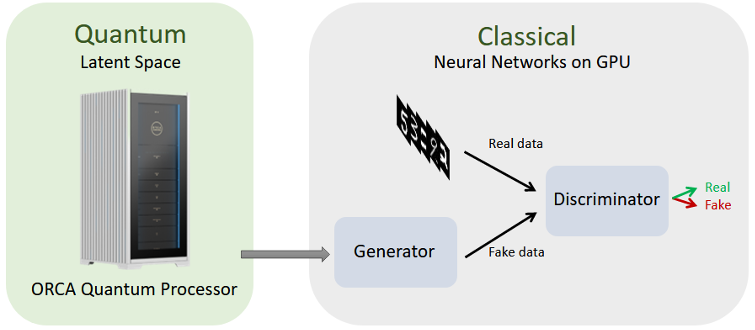
NEWS

ORCA Computing works with NVIDIA to implement hybrid quantum/classical algorithms
Quantum computing is a rapidly growing field with the potential for accelerating computationally demanding tasks in fields such as chemistry, biology, and finance. Although large-scale universal quantum computers are still several years away, recent advances in hardware have led to the development and commercialization of small-scale quantum processors that can solve some specific problems exponentially faster than classical (i.e., non-quantum) computers.
The best way to explore and leverage the new computational abilities provided by near-term quantum processors is within hybrid workflows involving both a quantum processor and an HPC system. In this approach, the workflow is broken up into tasks that can be accelerated with a quantum processor and tasks that are best left to the classical HPC system. The quantum processor solves the computational task for which it provides an advantage, while the HPC system is used for everything else. Performing these workflows requires tight integration at both hardware and software levels between both types of systems.

ORCA Computing (ORCA) has extensive experience in applying quantum technologies to machine learning. A concrete example of a hybrid quantum-classical workflow is ORCA’s hybrid generative adversarial network (GAN) algorithm illustrated above. In a classical GAN, two classical neural networks are trained to compete against each other. A generator converts random numbers drawn from a probability distribution called the “latent space” into data such as images, while a discriminator is trained to distinguish between fake data produced by the generator and the real dataset. The generator is trained to fool the discriminator, such that at the end of training, the discriminator can no longer tell the difference between the real data and the fake data produced by the generator. New data can then be produced by making the generator convert new random numbers drawn from the latent space into new images.
ORCA’s hybrid GAN algorithm uses a photonic quantum processor as the latent space used by the generator. The quality of the data produced by the generator strongly depends on the type of latent space that is used. Informally, if the latent space has characteristics in common with the data the generator is trying to learn to produce, then the generator will learn faster and better. Using a quantum latent space is thus expected to improve a GAN’s performance on some datasets such as those used in quantum chemistry.
ORCA has performed an experimental demonstration of this algorithm on an image dataset, using its PT-Series photonic quantum processor as a latent space and using 8 NVIDIA A100 Tensor Core GPUs to train the classical neural networks used by the generator and the discriminator. This demonstration was facilitated by having both the PT-Series and the NVIDIA GPUs in the same premises, which enables secure and low-latency communication between both systems.
To transition from proof of concept to production, ORCA’s PT-Series quantum processor is integrating with NVIDIA CUDA Quantum, an open-source platform that provides a unified programming model for integrating and programming hybrid workflows involving GPUs, CPUs, and QPUs. Designed to be QPU agnostic, NVIDIA CUDA Quantum is built for scalability and performance across heterogeneous compute environments, allowing for streamlined interoperability with GPU-accelerated applications.
“Hybrid quantum-classical computing has the potential to reshape the way industry leaders collaborate to solve some of the world’s toughest challenges,” said Timothy Costa, director of high-performance computing and quantum at NVIDIA. “NVIDIA CUDA Quantum enables ORCA’s PT-Series photonic quantum processor to seamlessly develop and integrate hybrid workflows, unlocking a new age of quantum computing and making it more accessible to researchers than ever.”
ORCA has already developed a programmatic interface to the PT-Series, allowing users to interact with it using NVIDIA CUDA Quantum and build simple hybrid workflows involving GPUs. Future plans involve integrating NVIDIA CUDA Quantum further up into ORCA’s software stack, which will underpin ORCA’s work on scaling more advanced algorithms such as the hybrid GANs so that they can solve complex real-world problems. This collaboration is an exciting opportunity for ORCA to use its expertise to develop novel computing infrastructure and enable new types of algorithms with NVIDIA.


